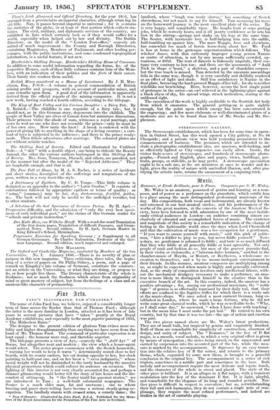31insir.
Romance, at Etude Bnilante, pour le Piano. Composies par S. TV. TVaky.
Mr. Waley is an amateur, possessed of genius and learning as a com- poser, and of power as a performer on the pianoforte, which entitle him to a place among the most distinguished professional musicians of the day. His compositions, both vocal and instrumental, are already known and esteemed in our best musical circles; and his performances of the works of the great masters, at the concerts of the Amateur Musical So- ciety, have been listened to with admiration by one of the most fastidi- o 7 critical audiences in London—an audience consisting almost ex- clusively of educated and accomplished lovers of music. The existence and magnitude of this society is a remarkable indication of the change of feeling in the fashionable world since the days when Lord Chesterfield said that the cultivation of music was a low occupation for a gentleman. " If you want to amuse yourself with music," said this pink of polite- ness, "hire a fiddler to play to you, but never fiddle yourself." Now- a-days, no gentleman is ashamed to fiddle; and taste is so much diffused that they who fiddle at all generally fiddle at least agreeably. Not only people of rank and fashion do so, but men of the gravest pursuits find, in their violin or violoncello, a "laborum dulce lenimen," and find in the chamber-music of Haydn, or Mozart, or Beethoven, a wholesome re- creation to themselves, and a by no means inelegant entertainment to their friends. In like manner, amateur composers are multiplying among us, as might be expected when music is highly and generally Cultivated. And, as the study of composition involves only intellectual labour, with- out the mechanical drudgery necessary to make a performer, an ama- teur is more likely to distinguish himself in the creative than in the executive branch of the art. In this country, indeed, the amateur has a positive advantage ; for, among our professional musicians, the " noble rage " of genius is so effectually repressed by their daily toil, that their efforts are confined to the fugitive trifles for which there is a ready sale at the music-shops. We once asked a most eminent German, long es- tablished in London, where he made a large fortune, why he did not write some great classical works, which he was so well able to do. "Why, so I shall some day," he answered, " when I have done with teaching ; but in the mean time I must make the pot boil." He retired to his own country, but by that time it was too late—the age of ardour and exertion was past.
The two pieces named above are Mr. Waley's latest productions. They are of small bulk, but inspired by genius and exquisitely finished. Both of them are remarkable for simplicity of construction, clearness of design, and unity of subject. The " Romance," in the key of D flat major, is a smooth, vocal melody, to which a very original effect is given by means of syncopation ; the notes being struck on the unaccented and carried by suspension into the accented part of the bar, while the mea- sure is marked by the accompaniment. It digresses by an easy transi- tion into the relative key of B flat minor, and returns to the primary theme, which, expanded by some new ideas, is brought to a graceful conclusion in the original key. The accompaniment is a series of rich triplets, sometimes in a middle part and sometimes in the bass. Both melody and accompaniment require the most delicate and legato touch, and the character of the whole is sweet and placid. The style of the other piece is brilliant. It is an allegro in A flat major, with a transient modulation into the key of the dominant E flat. It is light, playful,
and remarkable for the elegance of its long and rounded periods. - ther piece is difficult in respect to execution ; but as, notwithstanding their full and rich harmonies, they do not contain a single note of rem- plissage, they require the most refined performance, and indeed are studies in the art of cantabile playing.






























 Previous page
Previous page